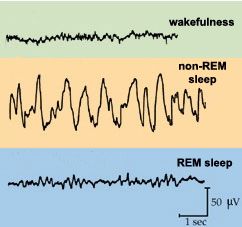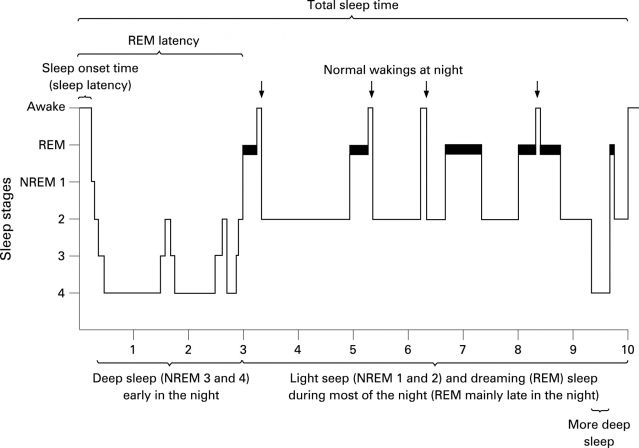Sleep
How Much Does One Hour of Lost Sleep Matter?
Slow-wave sleep loss means poor learning.
Posted October 22, 2012
Suppose that your fifth-grader typically goes to bed at 9:30 PM on school nights and gets up at 6:30 AM. Since it often takes a little while to fall asleep after getting into bed, that means 8.5 to nine hours of sleep on school nights. First of all, that is 1.5 to two hours less sleep than the 10 to 11 recommended by pediatricians and sleep researchers. Now consider what happens when for any of a number of perfectly good reasons, the child gets to bed an hour later than usual. That hour converts to 12 percent less sleep time, which some might conclude is not very much. But that number does not reflect the true degree of insufficiency of an hour’s lost sleep.
During sleep, we cycle through different types, or stages of sleep. Around 20 to 25 percent of sleep is rapid eye movement (REM) sleep, characterized not only by movement of muscles around the eyes, but by high frequency, low amplitude brain waves (EEG), high brain metabolic rate, absence of musculoskeletal tone, and dreaming. Brain waves in REM sleep look very similar to waking brain waves. The remaining 75 to 80 percent of sleep is non-REM, and is divided into different stages reflecting more depth of sleep. Non-REM sleep is called Slow-Wave sleep characterized by low frequency, high amplitude EEG waves. Sometimes I like to think of slow waves in sleep as comparable to ocean swells versus the choppy waves of a rough sea.

Scientists have further categorized Slow-Wave sleep into four stages, with Stages 1 & 2 representing lighter sleep and Stages 3 & 4 deeper sleep. Every night, we cycle through these stages roughly every 90 minutes, going from lighter sleep to deeper sleep to REM sleep and back four or five times during the sleep period.

That is why getting an hour less sleep matters more than it seems. While overall sleep time might be reduced by 12 percent, that hour might include as much as 25 percent of REM or Slow-Wave sleep.
Why would it matter that someone is only getting 75 percent of REM or Slow-Wave sleep needed? It is becoming clear that sleep plays a role in consolidating and strengthening memories of information learned during waking (e.g. Walker & Stickgold, 2006), and Slow-Wave sleep is particularly important. We know this because of results from studies where sleep is experimentally altered by waking persons up when their sleep is in a certain stage. These studies point to the important role of Slow-Wave sleep in learning and memory (e.g. Landsness et al., 2009).
This explanation helps in understanding why many studies have shown that less sleep time is associated with poorer attention, learning, memory, and grades in school. Wolfson and Carskadon (1998) discovered that children who were struggling in school with grades of C and below were sleeping around 25 minutes less than children making As and Bs. What appears to be a small difference in sleep time may be a much larger difference in terms of sleep in stages most important for learning.
Landsness, et al. (2009). Sleep-dependent improvement in visuomotor learning: A causal role for slow waves. Sleep, 32, 1273 - 1284.
Walker, M. P., & Stickgold, R. (2006). Sleep, memory, and plasticity. Annual Review of Psychology, 10, 139 -166.
Wolfson, A. R., & Carskadon, M. A. (1998). Sleep schedules and daytime functioning in adolescents. Child Development, 69, 875 - 887.


